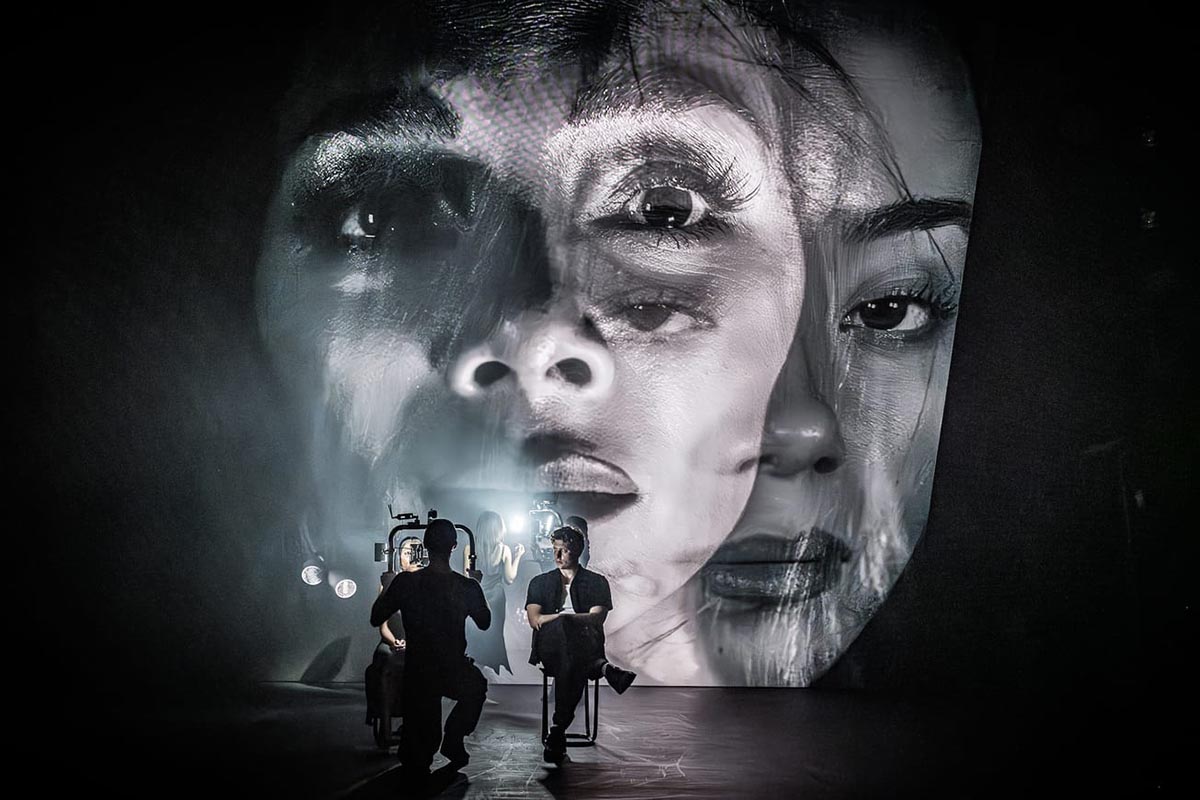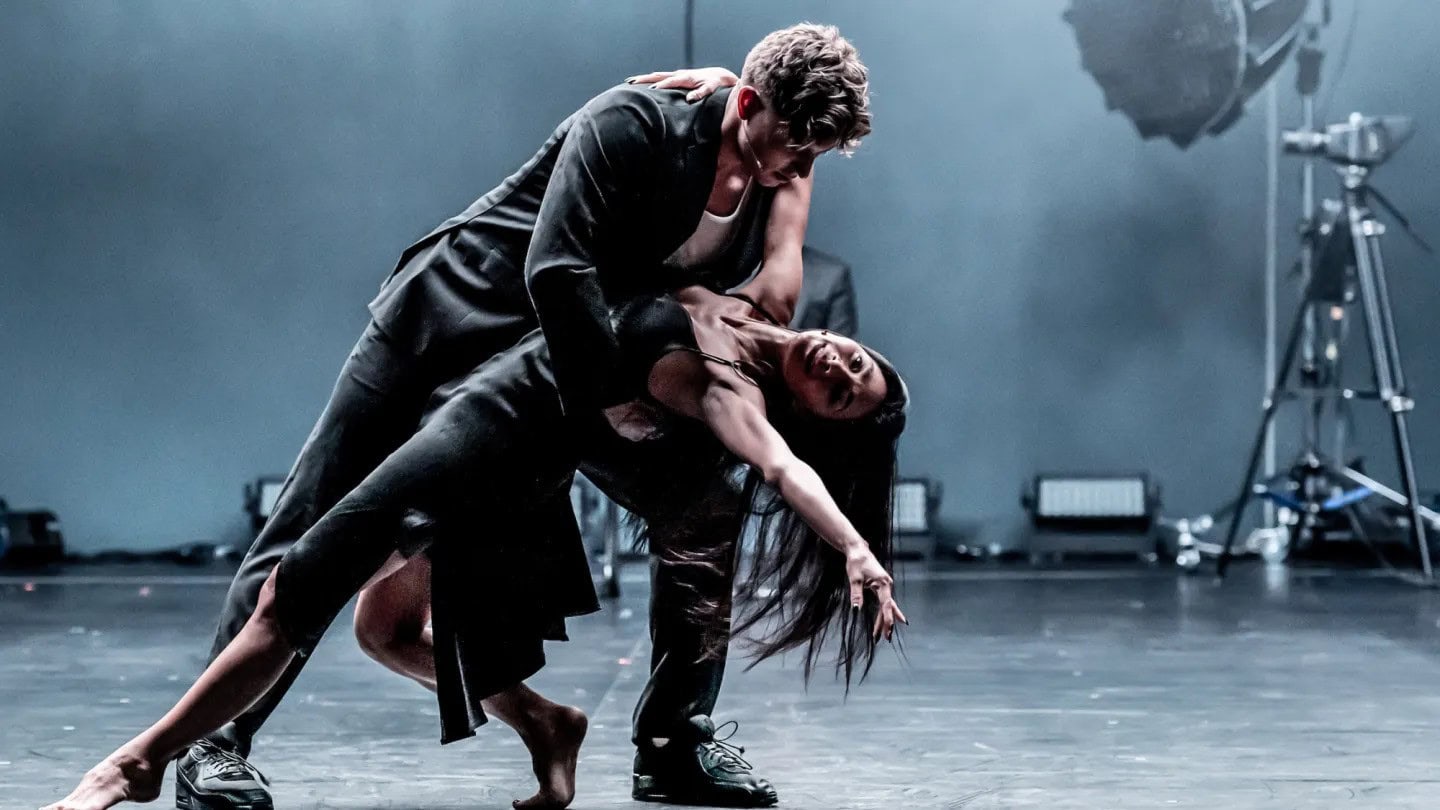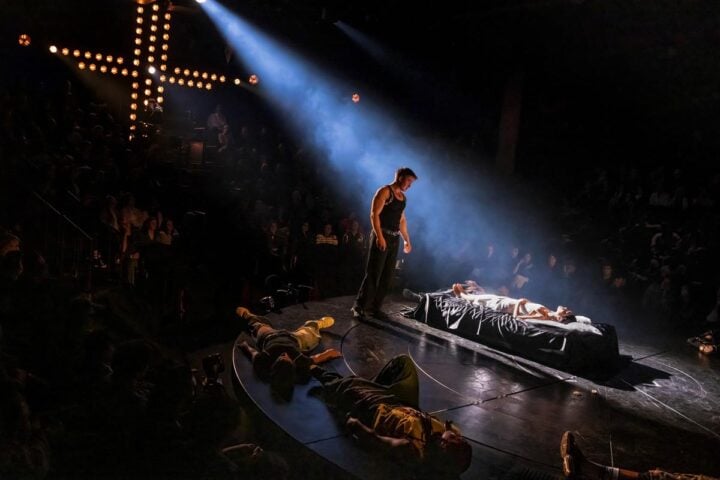In June, Cats: The Jellicle Ball seemed to shake Andrew Lloyd Webber’s Cats like a bottle of champagne, joyfully letting the old, vexatious material burst out on the stage at the Perelman Arts Center with glittery effervescence. Now, returning to Broadway in a stripped-down West End transfer, the heavy bones of Sunset Boulevard—Webber’s ponderous music, Don Black and Christopher Hampton’s repetitive lyrics, the general plodding approach to Billy Wilder’s 1950 film—drag behind director Jamie Lloyd’s austere vision like a body bag.
Lloyd’s ethos is all about turning the audience toward the text and performance, sharpening the listener’s ear by stripping away all the trappings of traditional productions, including, most of the time, eye contact between actors. That worked splendidly for his Cyrano de Bergerac at BAM two years ago with James McAvoy, as Edmond Rostand’s play is about the power of language itself. With A Doll’s House, starring Jessica Chastain on Broadway last year, the method succeeded, too, communicating the confines of Nora’s claustrophobic home life through close-quartered, ASMR-like sound design. (Betrayal, in 2019, suffered, since Harold Pinter’s naturalistic dialogue drifted out to sea with Lloyd’s extra-languorous pacing.)
But take away everything except the words and the music here and you’ve exposed how tedious a musical Sunset Boulevard really is, even with a scintillating presence like Nicole Scherzinger at the center. The show has derived something of a false importance in the canon simply because it arrived with good timing at musical theater’s nadir, winning best musical, book, and score by default in 1995 as the only new musical to open that season that wasn’t a revue.
Based on Wilder’s viciously dark, droll film, Sunset Boulevard follows would-be screenwriter Joe Gillis (Tom Francis) to the home of washed-up silent film star Norma Desmond (Scherzinger). Norma’s been left behind by the vicissitudes of time and the demands of the talkies, but she’s convinced that she will soon be on top again and that Joe can take her there. It’s not a “comeback,” she insists, but a “return.” For Joe, all it’ll cost him to cash in on Norma’s delusions is his dignity, his body, and, ultimately, his life. The musical’s paint-by-numbers approach lost sight of most of Wilder’s winking self-awareness, copy-pasting the dialogue but deleting the satire, and it’s here that Lloyd, in seeking a new tone, comes to a crossroads.
Gone are the giant scenery and glamorous costumes that distinguished past productions. Here, the stage is empty—no props save for an occasional steering wheel, a handful of chairs, and, more bewilderingly, a Macbook—and everyone wears black and white, the usually befeathered and bejeweled Norma clad only in a velvety black slip. Previously unfathomable amounts of fog billow forth from the wings throughout. It’s extremely dark and despondent from the start.
At the same time, though, Lloyd seems eager to re-inject the musical’s missing side-eye with a campiness that works best when it belongs to Norma, whose only mutual relationship is with the camera. Much of the storytelling happens here through live camera footage projected on a proscenium-high screen. When the camera operator is close to Norma, she can’t look away, and Scherzinger excels at mugging into the lens, trying on faces and personas as if in a perpetual screen-test. Since Lloyd doesn’t care for characters making eye contact anyway, it makes sense that the camera is Norma’s most intimate, closest connection.
But there’s a lot of camera work—and a lot of Sunset Boulevard—that isn’t about Norma. Some early moments, like a credit sequence projected over live close-ups of Joe speeding through Hollywood, are gesturally overwhelming, with the magnification of Joe’s face above the relative smallness of his on-stage body feeling like a dramatic lightning rod. But neither the overarching foggy, dark pallor nor the campy asides are well-equipped to, for example, deal with the vast, dry deserts of this score. The ensemble sings blandly about the challenges of the movie business and, in a particularly numbing sequence, their New Year’s Eve resolutions.

That’s a mega-musical problem that a minimalistic production can’t solve, as Sunset Boulevard was always bloated, not only with hulking, flying sets but also with characters and material. And when Lloyd directs indistinguishable chorus members in matching costumes to step forward to sing their featured lines straight out to the audience, he makes it difficult to know who anyone is supposed to be. He sacrifices clarity on the altar of style again and again.
That’s especially true in the show’s most attention-getting sequence. Francis, moodily appealing throughout, sings the title song while exiting the theater, posing by the poster of his own image, dodging tourists (and Broadway fans waiting outside to capture the moment for TikTok), and marching around Shubert Alley, all live-streamed. It’s an impressive audio-visual feat, but what does the liveness of an outdoor video feed or the sudden interjection of 2024 Times Square into 1950 Hollywood contribute to Joe’s story that outweighs whatever he’s singing about in that moment? And audiences certainly aren’t primed to pay attention to what he is singing about when the staging is all about the perils of crossing 44th Street.
The infusion of camp into the videography—Norma’s doting manservant, Max (David Thaxton), communicates mainly through close-up shots of over-exaggerated leers and frowns—can’t keep up with the tonal instability of the writing. Halfway through the sappy “Too Much In Love to Care,” a romantic duet for Joe and the plucky script reader Betty Schaefer (Grace Hodgett Young), there’s a live shot projected of Betty’s abandoned fiancé removing his mic with a single tear running down his cheek. But Lloyd Webber clearly penned the song’s melody with earnest intentions, if meandering execution, so the video commentary reads as apology, as if Lloyd wants us to know he thinks the song is endless and boring and mockable too. (Lloyd never persuades that the need to tell this story isn’t just a Trojan horse for his auterish shenanigans, but this revival’s only generosity of spirit is that it’s not just Jamie inside the Trojan horse.)
Norma writes herself a behemoth of a film script about Salome not because she believes in the material, but because she believes in herself and demands that the world deserves to see her shine again. The vehicle matters less than who’s riding in it. There’s more than a little bit of Salome in a Sunset Boulevard that venerates Scherzinger, who, after almost a decade as the lead singer of the Pussycat Dolls, struggled to launch a solo career and recapture the spotlight.
The difference between Norma and Scherzinger, of course, is that Scherzinger is really good. Really good, at least, at stepping on to the pedestal and earning the sort of diva worship that Lloyd’s production invites. (Scherzinger receives entrance applause on three different occasions before she first speaks.) She sings with tremendous force, tearing into the score’s best song, “As If We Never Said Goodbye,” with a quivering ferocity that grows in confidence. She’s meek, ravenous, maliciously coy, and tremblingly unhinged. Throughout, she lends Norma a physical grace and playful suppleness. At one point she gleefully does the robot, and at another she contorts and howls monstrously, gutturally, while dripping with blood.
That, though, doesn’t cohere into a presentation of Norma as a credible human being, but credible characterization isn’t what Lloyd’s production, which pulls out all the stops to pull focus from the actual story being told, calls for. Norma is afraid that she’s been forgotten by an industry that salivates over faces, bodies, and voices before then spitting them out when they’re no longer deemed marketable enough. If we give Scherzinger the singer and not the character she’s playing a standing ovation in the middle of a song—as Lloyd’s staging encourages many audience members to do—cheering over her while she’s in the middle of expressing words we now can’t possibly hear, maybe we’ve already lost sight of Norma Desmond.
Sunset Boulevard is now running at the St. James Theatre.
Since 2001, we've brought you uncompromising, candid takes on the world of film, music, television, video games, theater, and more. Independently owned and operated publications like Slant have been hit hard in recent years, but we’re committed to keeping our content free and accessible—meaning no paywalls or fees.
If you like what we do, please consider subscribing to our Patreon or making a donation.





